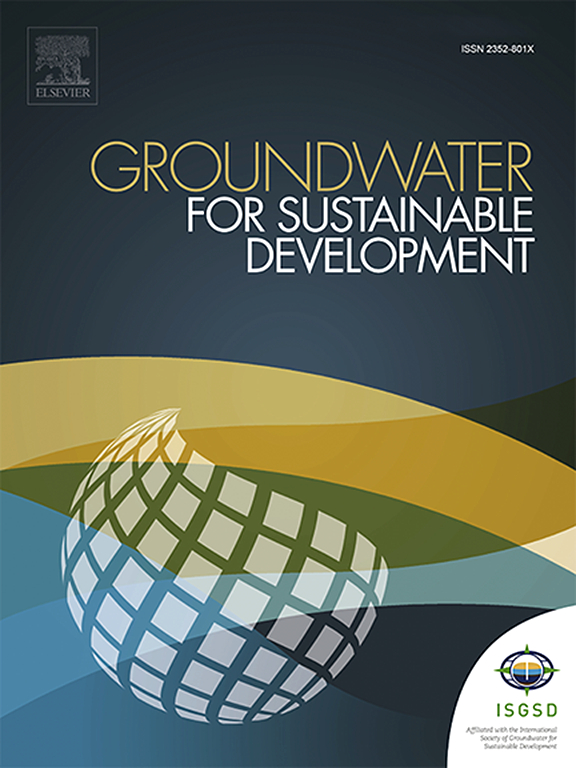Hybrid machine learning for predicting groundwater level: A comparison of boosting algorithms with neural networks
IF 4.9
Q2 ENGINEERING, ENVIRONMENTAL
引用次数: 0
Abstract
This study proposes a novel hybrid machine learning framework that integrates gradient boosting (XGBoost, LGBM) and neural network models (LSTM, MLP) with Basin Hopping Optimization (BHO) to improve groundwater level forecasting. The approach simultaneously optimizes input lag times and model hyperparameters, addressing a key limitation in previous studies. Four hybrid models (XGBoost-BHO, LGBM-BHO, LSTM-BHO, MLP-BHO) are evaluated for daily one-to seven-day-ahead predictions, incorporating meteorological inputs. Results showed that all models achieved high predictive accuracy (R2 > 0.98), with LSTM-BHO yielding the lowest MAE and RMSE across both boreholes. Boosting models, particularly XGBoost-BHO, demonstrated strong short-term performance with narrow residual distributions and significantly lower computation time. These findings highlight the effectiveness of combining machine learning and metaheuristic optimization for robust groundwater forecasting.

用于预测地下水位的混合机器学习:提升算法与神经网络的比较
本文提出了一种新的混合机器学习框架,该框架将梯度增强(XGBoost, LGBM)和神经网络模型(LSTM, MLP)与盆地跳跃优化(BHO)相结合,以改进地下水位预测。该方法同时优化了输入滞后时间和模型超参数,解决了以往研究中的一个关键限制。结合气象输入,对四种混合模式(XGBoost-BHO、LGBM-BHO、LSTM-BHO、MLP-BHO)进行了每日1 - 7天预报评估。结果表明,所有模型都具有较高的预测精度(R2 > 0.98),其中LSTM-BHO在两个井眼中产生的MAE和RMSE最低。增强模型,特别是XGBoost-BHO,表现出较强的短期性能,残差分布窄,计算时间显著缩短。这些发现强调了将机器学习和元启发式优化相结合用于稳健地下水预测的有效性。
本文章由计算机程序翻译,如有差异,请以英文原文为准。
求助全文
约1分钟内获得全文
求助全文
来源期刊

Groundwater for Sustainable Development
Social Sciences-Geography, Planning and Development
CiteScore
11.50
自引率
10.20%
发文量
152
期刊介绍:
Groundwater for Sustainable Development is directed to different stakeholders and professionals, including government and non-governmental organizations, international funding agencies, universities, public water institutions, public health and other public/private sector professionals, and other relevant institutions. It is aimed at professionals, academics and students in the fields of disciplines such as: groundwater and its connection to surface hydrology and environment, soil sciences, engineering, ecology, microbiology, atmospheric sciences, analytical chemistry, hydro-engineering, water technology, environmental ethics, economics, public health, policy, as well as social sciences, legal disciplines, or any other area connected with water issues. The objectives of this journal are to facilitate: • The improvement of effective and sustainable management of water resources across the globe. • The improvement of human access to groundwater resources in adequate quantity and good quality. • The meeting of the increasing demand for drinking and irrigation water needed for food security to contribute to a social and economically sound human development. • The creation of a global inter- and multidisciplinary platform and forum to improve our understanding of groundwater resources and to advocate their effective and sustainable management and protection against contamination. • Interdisciplinary information exchange and to stimulate scientific research in the fields of groundwater related sciences and social and health sciences required to achieve the United Nations Millennium Development Goals for sustainable development.
 求助内容:
求助内容: 应助结果提醒方式:
应助结果提醒方式:


